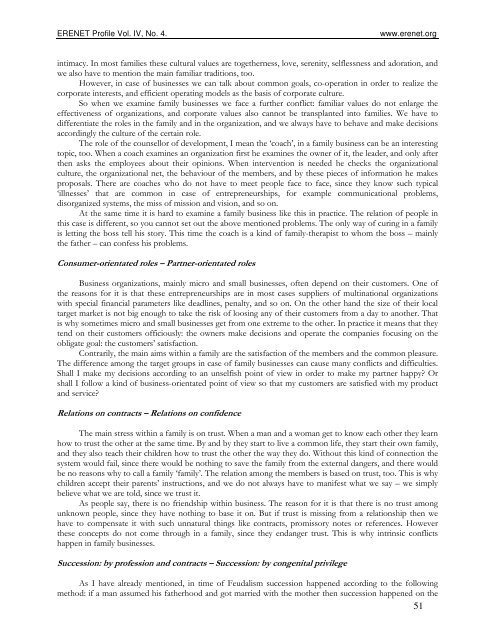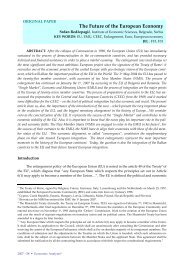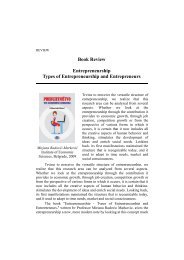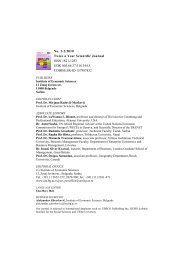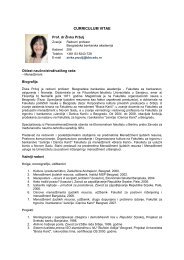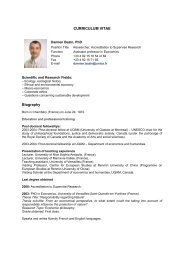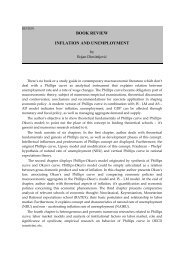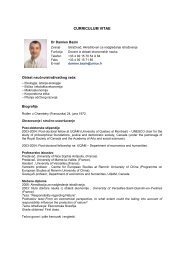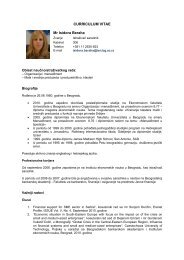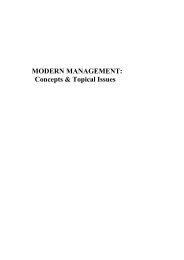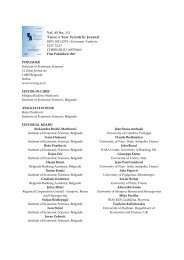Issue 16
Issue 16
Issue 16
You also want an ePaper? Increase the reach of your titles
YUMPU automatically turns print PDFs into web optimized ePapers that Google loves.
ERENET Profile Vol. IV, No. 4.<br />
www.erenet.org<br />
intimacy. In most families these cultural values are togetherness, love, serenity, selflessness and adoration, and<br />
we also have to mention the main familiar traditions, too.<br />
However, in case of businesses we can talk about common goals, co-operation in order to realize the<br />
corporate interests, and efficient operating models as the basis of corporate culture.<br />
So when we examine family businesses we face a further conflict: familiar values do not enlarge the<br />
effectiveness of organizations, and corporate values also cannot be transplanted into families. We have to<br />
differentiate the roles in the family and in the organization, and we always have to behave and make decisions<br />
accordingly the culture of the certain role.<br />
The role of the counsellor of development, I mean the ‘coach’, in a family business can be an interesting<br />
topic, too. When a coach examines an organization first he examines the owner of it, the leader, and only after<br />
then asks the employees about their opinions. When intervention is needed he checks the organizational<br />
culture, the organizational net, the behaviour of the members, and by these pieces of information he makes<br />
proposals. There are coaches who do not have to meet people face to face, since they know such typical<br />
‘illnesses’ that are common in case of entrepreneurships, for example communicational problems,<br />
disorganized systems, the miss of mission and vision, and so on.<br />
At the same time it is hard to examine a family business like this in practice. The relation of people in<br />
this case is different, so you cannot set out the above mentioned problems. The only way of curing in a family<br />
is letting the boss tell his story. This time the coach is a kind of family-therapist to whom the boss – mainly<br />
the father – can confess his problems.<br />
Consumer-orientated roles – Partner-orientated roles<br />
Business organizations, mainly micro and small businesses, often depend on their customers. One of<br />
the reasons for it is that these entrepreneurships are in most cases suppliers of multinational organizations<br />
with special financial parameters like deadlines, penalty, and so on. On the other hand the size of their local<br />
target market is not big enough to take the risk of loosing any of their customers from a day to another. That<br />
is why sometimes micro and small businesses get from one extreme to the other. In practice it means that they<br />
tend on their customers officiously: the owners make decisions and operate the companies focusing on the<br />
obligate goal: the customers’ satisfaction.<br />
Contrarily, the main aims within a family are the satisfaction of the members and the common pleasure.<br />
The difference among the target groups in case of family businesses can cause many conflicts and difficulties.<br />
Shall I make my decisions according to an unselfish point of view in order to make my partner happy? Or<br />
shall I follow a kind of business-orientated point of view so that my customers are satisfied with my product<br />
and service?<br />
Relations on contracts – Relations on confidence<br />
The main stress within a family is on trust. When a man and a woman get to know each other they learn<br />
how to trust the other at the same time. By and by they start to live a common life, they start their own family,<br />
and they also teach their children how to trust the other the way they do. Without this kind of connection the<br />
system would fail, since there would be nothing to save the family from the external dangers, and there would<br />
be no reasons why to call a family ‘family’. The relation among the members is based on trust, too. This is why<br />
children accept their parents’ instructions, and we do not always have to manifest what we say – we simply<br />
believe what we are told, since we trust it.<br />
As people say, there is no friendship within business. The reason for it is that there is no trust among<br />
unknown people, since they have nothing to base it on. But if trust is missing from a relationship then we<br />
have to compensate it with such unnatural things like contracts, promissory notes or references. However<br />
these concepts do not come through in a family, since they endanger trust. This is why intrinsic conflicts<br />
happen in family businesses.<br />
Succession: by profession and contracts – Succession: by congenital privilege<br />
As I have already mentioned, in time of Feudalism succession happened according to the following<br />
method: if a man assumed his fatherhood and got married with the mother then succession happened on the<br />
51


